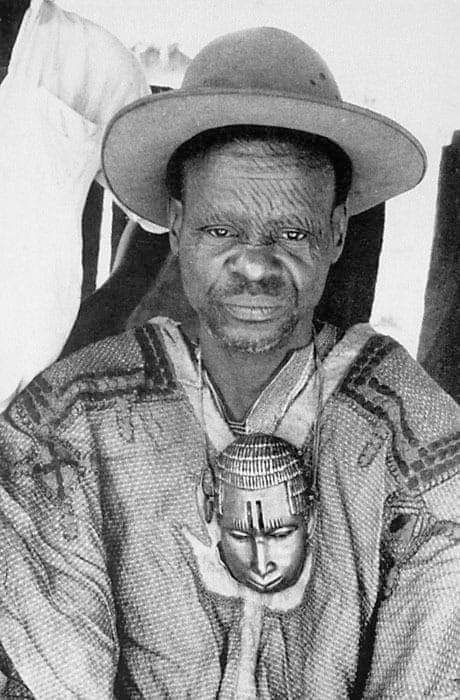Stock Exchange was introduced for the first time in Nri, for instance stock exchange was associated with Ọzọ title. In this system, a person who had belonged to one of the alliance groups called Ogwe Mmuo.
The candidate for the title will purchase a total of Nine (9) shares known as “Ọfọ Itenanị”. The shares are known as “Ọfọ” the stall of immortality. The Ọzọ titled man will get his entitlements depending on the number of Ọfọ Ọzọ he has.
An Ọzọ man with nine Ọfọ Ọzọ will be entitled to nine shares whenever a new person took the title and made payment. One could sell his Ọfọ, except three, within his Ọzọ group at a loss or profit, whenever he is in need of money.
He could use his Ọfọ as security for a loan, the person giving the loan will take the shares allocated to the Ọfọ whenever payments of share were made until the capital and interest were paid back by the owner of the Ọfọ. If a man dies his male children will inherit the total Ọfọ Ọzọ and the allocated shares.
Shares of Ọfọ Ọzọ lapses two years after the man’s death, it is known as ovunisi. The family of the dead Ọzọ man will continue to take all shares accruing from the Ọfọ Ọzọ left. The son could use one of the Ọfọ Ọzọ in taking his own Ọzọ title. If he did this he would continue to take shares accruing from his own Ọfọ and those inherited. If he has brothers, the Ọfọ Ọzọ of their father would be shared according to the law of inheritance in Nri.
The Ọfọ, the staff of immortality, ritual and political authority was converted into a type of security certificate. Nri used the ritual system to achieve economic enhancement via Stock Exchange. This cultural civilization was introduced to Igbo – land before the coming of the British Colonial Administration.
Therefore, Nri bequeathed this highly civilized pattern of exchange to Igbo – land.
Eze – Nri introduced the four market days to the Igbo Land, namely Eke, Oye (Orie), Afọ and Nkwọ. In each of the communities where the Eze – Nri establishes these markets, he will keep one of his Alụsị (Deity at that market square, and leave one of his agents to take care of that Alụsị. The inhabitants of that community will pay allegiance to the Eze – Nri through that agent, especially during the Ịgụ – Arọ ceremony of Eze – Nri.
It is on record in Igbo land that Eze – Nri introduced agriculture in Igboland. He introduced yam, cocoyam, and other cash crops in Igbo – land. That is why at every Ịgụ – Arọ ceremony, His Majesty the Eze – Nri will share out seed – yams to the people present, to go and plant. This symbolizes the introduction of yam to the Igbo race.
LIST of PAST EZE – NRI AND ORDER of REIGN:
(1) Nri – Ifikuanịm 1043 – 1158
(2) Nri – Namoke (from Diodo) 1090 – 1158
(3) Nri – Buife (From Obeagụ Unified Ọfọ N’alọ Agukwu and Diodo) 1159 – 1259
(4) Nri – Ọmalọ (Uruọji) 1260 – 1299
(5) Nri – Jiọfọ 1 (Agbadana) 1300 – 1390
(6) Nri – Ọmalonyeso (Obeagu) 1391 –1464
(7) Nri – Anyamata (Uruọji) 1465 – 1511
(cool Nri – Fenenu (Agbadana) 1512 – 1582
(9) Nri – Agụ (Obeagu) 1583 – 1676
(10) Nri – Apia and Nri – Alike (both from Uruọji died the same day) 1677 – 1700
(11) Nri – Ezimilo (Agbadana) 1701 – 1723
(12) Nri – Enwenetem (Agbadana) 1724 – 1794
(13) Nri – Enwelana 1 (Obeagu) 1795 – 1886
(14) Nri – Ọbalike (Uruọji) 1889 – 1936
(15) Nri – Jiofọ II Taabansi Udene (Agbadana) 1937 – 1987
(16) Nri – Enwelana II Obidiegwu Onyeso (MFR) (Obeagu) 1988 – Present
NRI AGE GRADES:
(1) Oliokuku between 1846 – 1854
(2) Irunatọ between 1855 – 1863
(3) Umezọba between 1864 – 1866
(4) Ijele between 1867 – 1872
(5) Atụ between 1873 – 1875
(6) Ugo between 1876 – 1878
(7) Ọchokwu between 1879 – 1881
(cool Olimgba between 1882 – 1887
(9) Ekwueme between 1888 – 1890
(10) Mmanenyi between 1891 – 1896
(11) Irugo between 1897 – 1902
(12) Iruagụ between 1903 – 1905
(13) Iruatọ between 1906 – 1908
(14) Nri buenyi between 1909 – 1911
(15) Iruenyi between 1912 – 1914
(16) Ọkpatụ between 1915 – 1917
(17) Ifediọra between 1918 – 1920
(18) Amakaekwu between 1921 – 1923
(19) Abakarị between 1924 – 1929
(20) Atigwe between 1927 – 1929
(21) Akpalị between 1930 – 1932
(22) Akụm between 1933 – 1935
(23) Amuoku between 1936 – 1938
(24) Ọkuanị (Omenyi) between 1939 – 1941
(25) Udokafulukwu between 1942 – 1944
(26) Ndụkakụ between 1945 – 1947
(27) Chikwado between 1948 – 1950
(28) Ofuobi between 1951 – 1953
(29) Nri Jiọfọ between 1957 – 1956
(30) Nri Bụ isi Igbo between 1957 – 1959
(31) Ọdinanị between 1960 – 1963
(32) Nri bu Ofu between1964 – 1966
(33) Nri Ezuo between 1967 – 1969
(34) ? between 1970 – 1972
(35) between 1973 – 1975


